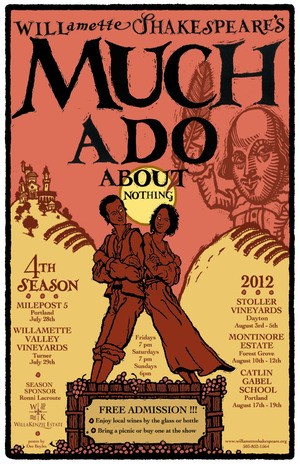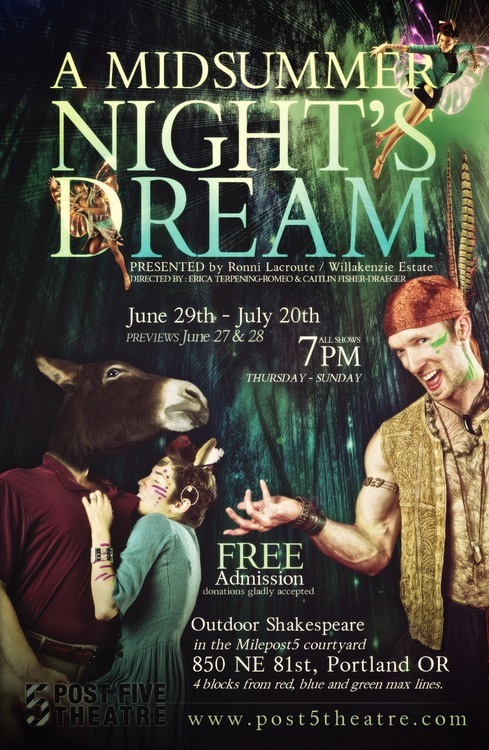Review of University of Portland's A Midsummer Night's Dream, 13 April 2012
At the closing of A Midsummer Night’s Dream, Puck addresses the audience:

If we shadows have offended,
Think but this, and all is mended,
That you have but slumber'd here
While these visions did appear.
And this weak and idle theme,
No more yielding but a dream,
Gentles, do not reprehend:
if you pardon, we will mend:
And, as I am an honest Puck,
If we have unearned luck
Now to 'scape the serpent's tongue,
We will make amends ere long;
Else the Puck a liar call;
So, good night unto you all.
Give me your hands, if we be friends,
And Robin shall restore amends. (5.1.2275-2290)
Normally, when I hear this, I find myself thinking there’s no offense to mend, nothing to pardon, no amends to restore. It has been a happy dream, and I’m more than willing to extend my hands to Robin Goodfellow in friendship.
Not so at the University of Portland’s production of A Midsummer Night’s Dream. By the end, as much as I wished it possible, I was sure that no amount of pardoning could mend such an atrocity. I realize that this is a college production, and nowhere near in the same league as “professional” theatre… but even with that consideration, I give it a D-. I can’t remember seeing another play where I spent the first half wondering if I should stay for the second.
It would be one thing if it were just a play, poorly done, badly interpreted and ineptly staged. But this was the product of a college drama department, where students ought to be learning theatre skills and techniques – how to do things right, how to look and act appropriately to their parts and, most of all, how to be true to the script.
The purpose of all aspects of theatre is to advance the story and help the audience feel like they’re there, not to draw attention to themselves. Theatre is storytelling, and the minute we forget that is the minute we stop being true to the script. All departments would do well to remember this – costuming, make-up, lighting, sound, set design, and certainly the actors themselves. A drama program that neglects to teach its students this has grievously neglected their education.
Stage make-up, for example, is there mainly to make sure we can see the facial expressions of the actors under the lights. Oh sure, there are some characters whose make-up is part and parcel with their costuming – the odd scar here or there, the 1940’s glamour-girl make-up or, in this case, the fairies with their other-worldly face paint. And that’s fine, as long as it helps to define the character and stays true to the text. But that’s not the kind of make-up I’m talking about for the moment. The audience doesn’t want to see that the guys are wearing make-up. Deep down inside, we all know they are, but unless it’s part of their character (say, a clown or a cross-dresser), the make-up shouldn’t draw attention to itself.
It did. Distractingly. You see, not all stage make-up is created equal. And the amount of make-up you use for one venue and lighting scheme is different than the amount you use for another. This is what makes stage-make-up artists earn their living. Their job is to put just the right amount on so that the audience can see the facial expressions and the actors can look “normal” under the lights… but not more. I can see a drama department giving its students experience with a wide variety of types and styles of make-up… but if they don’t also give them the wisdom to know what is appropriate when, they’ve missed the mark.
Costuming, also, should enhance and help explain the characters. It should be consistent. It should look good on the stage. And it should have a reason for being the way it is. It is never OK to try something new with a costume just because you’ve always wanted to. It must help the story telling.
Megan La Fleur, senior at U. of P. and costume designer for Dream, has yet to learn this. Why in the world did she put Theseus (played by Clarke Orr, arguably one of the tallest people on that stage) in a suit coat with shoulders reminiscent of Lady Gaga or Romulans from the early 1990’s? They had no purpose, did not help define his character, and weren’t consistent. And it wasn’t like his entire world (because there are four worlds present in Dream) had the same look. He was the only one. And it looked weird.
She also needs to realize that it’s her job as costume designer to make sure that everyone’s costumes look right on the stage. Poor Cobweb’s costume was a pale yellow leotard with a black, sheer, cobwebby overlay, but under the stage lights she looked naked under the overlay. It was distracting and inappropriate. I’m guessing that in the costume shop it looked fine, but the costume designer’s job is to design for the theatre, not the costume shop.
I could go on, but I haven’t even come to the most problematic part: Puck. Whether the lion’s share of the blame goes to the director, Andrew Golla, or to the actress, Jessica Hillenbrand, is academic. But Puck was all wrong. From the moment she came on stage, I wondered if I had come to a strange mash-up of Midsummer Night’s Dream and Macbeth, because Hillenbrand was certainly channeling all three of the weird sisters, if nothing else. Her voice and physicality suggested pure evil, not a mischievous but good-hearted fairy. And if that wasn’t enough, she heaped on layers of completely inappropriate gestures – inappropriate to the play (because they didn’t go with her words at all, but distracted from them) and inappropriate to polite society in general (to my mind, at least, she was far across the line between physical and pornographic). Her best moments were when she dropped the act and stomped off stage in response to something Oberon told her to do.
If costuming and make-up, and indeed all aspects of theatre, should be drawn from the play itself and should enhance the story telling not detract from it, how much more, then, should the actors’ performances be drawn from the text. Hillenbrand’s wildly inaccurate and inappropriate representation of Puck was a huge distraction from the play itself. Puck is such a central character. Get him wrong, and practically the whole play is ruined.
I have to say “practically” because there were a few bright spots on the stage, even with everything that was so awful. The four young lovers – especially Helena (played by Eleanor Johnson) – were fairly well done. But then, Shakespeare is such genius, that no matter what you do with the two couples, it leads to hilarity.
The other bright spot was the Rude Mechanicals – especially Bottom (Charles Lattin). When they were on, I felt like I was finally seeing the play I had paid for.
But it wasn’t enough. The whole production was such a shambles that it was unredeemable, even though it was Shakespeare. And by that, I mean they used Shakespeare’s words… but they didn’t draw everything from the play itself, and that’s where they fell down. Drama is not license to do whatever you feel like, whether you are a costume designer, lighting tech, actor or even director. It’s a responsibility to be true to the play. And by doing a production like this, I feel that the drama department at University of Portland has let its students down. Perhaps they’ve gone through the steps and are working on their technical skills, but if all of that comes at the cost of actually producing the play whose text you are using, they’ve failed.

















